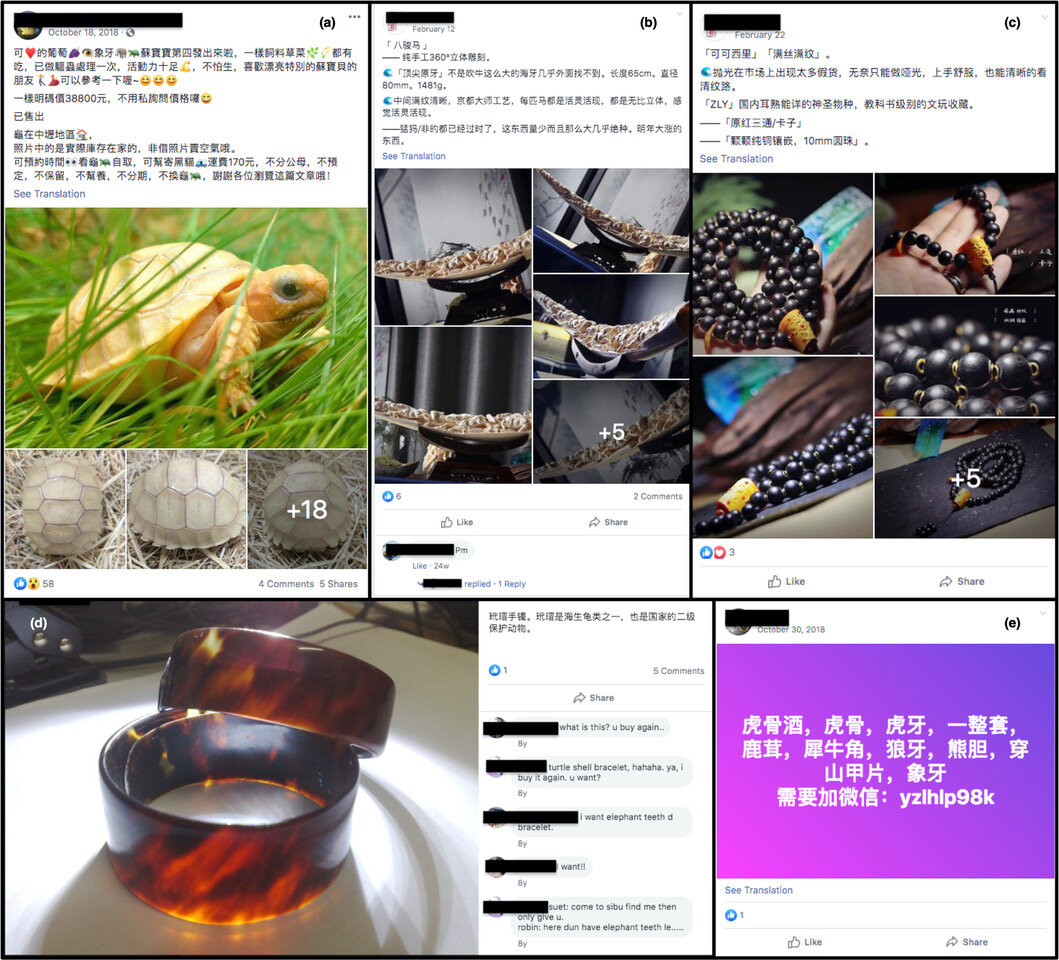
Wildlife Trade on e-Commerce Sites in China, with a Focus on Mammoth Ivory
In August 2020, the Wildlife Justice Commission conducted four months of research into the illegal wildlife trade on Chinese e-commerce platforms. Read the report here.

Two Clicks Away: Wildlife Sales on Facebook
This study was aimed at surveying whether Facebook has taken substantial action in fulfilling its pledge to remove 80% of wildlife trafficking content from its platforms by 2020. Read the report.

Wildlife in Peril: Animals are Traded, Tortured on Social Media
On social media, it’s easy to find posts advertising big cats, birds and primates for the exotic pet trade, as well as wildlife products made from species such as elephant ivory and pangolin scales. Download the fact sheet.

Wildlife seizures are down—and an illicit trade boom may be coming
A Nat Geo article assessed rates of wildlife trafficking in 2020, asking our experts for their opinions. While seizures for wildlife products such as pangolin scales, elephant ivory and rhino horn appear to have dropped, ACCO experts, who were widely consulted for the article, reported no significant difference in the number of online posts offering the sale of wildlife animals and their parts.

The black-market trade in wildlife has moved online, and the deluge is 'dizzying'
llegal wildlife ads have increased on Facebook despite its steps to combat animal trafficking. Crime watch groups are calling for broad legal reforms. Read the Nat Geo article on our wildlife report.

The Illegal Wildlife Digital Market: An Analysis of Chinese Wildlife Marketing and Sale on Facebook
At an estimated US$19 billion, the illicit wildlife trade is a serious threat to global conservation efforts. This criminal enterprise is now digital, expanding its footprint to consumers internationally by using the Internet and social media platforms. Read the report.

Illegal Online Trade in Endangered Parrots
This study of online trade in wild-sourced parrots is the first study of its kind about this highly threatened group of birds. By analyzing information contained within social media posts and public databases regarding trade in grey parrots over a four- year period, this investigation provides new insight into the scope and scale of trade, trade routes, modes of transport and the extent of compliance with national laws and international agreements. Read the report.

Automatic Detection of Potentially Illegal Online Sales of Elephant Ivory Via Data Mining
In this investigation, ACCO member David L. Roberts developed an automated system to detect potentially illegal elephant ivory items for sale on eBay. This work is an important step towards reducing poaching. Read the report.

How Facebook Groups Became a Bizarre Bazaar for Elephant Tusks
This investigative article by Wired looks at how Facebook Groups hawk wildlife and their products buyers across the globe. A team of experts, including ACCO Executive Director Gretchen Peters, weigh in on how to stop them. Read the article.

How Facebook became home to a thriving illegal wildlife marketplace
In this article/podcast, ACCO Executive Director Gretchen Peters describes how criminal networks operate on Facebook and are contributing to extinction of the elephant. Read the article.

Fighting for Animals
Front-line anti-poaching efforts are vitally important. The brave park rangers out in Africa's wild spaces must continue the hard and dangerous work they are doing. But we must complement what park rangers are doing by targeting the systems that facilitate the sale of illegal wildlife products to consumers. Read our Story Map.

Concern Over Social Media Trafficking of Great Apes
Before the Internet, live wild animals, plants and their products were normally traded in physical market places, auction houses or shops, limiting their numbers. Now, thousands of traders are selling millions of wild animals. This report, by ACCO member Dan Stiles, investigates the illegal trading of great apes.

Wildlife Traffickers Use Facebook, Instagram to Find Black-Market Buyers
Social networks and online marketplaces have long been hubs of illegal activity, including exotic animal trafficking. Smugglers use the platforms as digital billboards, often sharing photos and videos of their merchandise for users around the world to see. Read the Bloomberg article.

Cyber sleuths crack down on online wildlife crime
Attempts to clamp down on the online illegal wildlife trade have been boosted by more than a dozen recent interventions by law enforcement agencies in Europe, data collated by the #WildEye tool by Oxpeckers shows. The majority of these interventions resulted in convictions and arrests in cases involving several hundred thousand euros. Read the Earth Journalism Network article.

Cheetahs ‘being pushed to the brink of extinction’ by selfie-loving sheikhs’ ‘insatiable demand’ for big cat pets
The big cats are popular pets in the Middle East where a cub sells for up to £15,000. Three in four of the cubs die before reaching their prospective buyers, according to The Sun. Read the article.

African grey parrots: How social media is facilitating both illegal trade and the fight against it
As endangered African grey parrots are removed in their hundreds from the forests of their natural habitats, a new study has highlighted how social media facilitates this trade and how governing bodies, airlines and technology companies can play their part in preventing it. Read the article.

The illegal trade in freshwater turtles and tortoises, including species on the brink of survival, to supply the pet trade, is a multi-million-dollar industry. The scale of the trafficking gives cause for serious concern about the ability of some of the plundered populations to recover in the wild. The Wildlife Justice Commission launched Operation Dragon in 2016 to shine a spotlight on the crimes, the criminals and the corruption that facilitates trafficking.


















